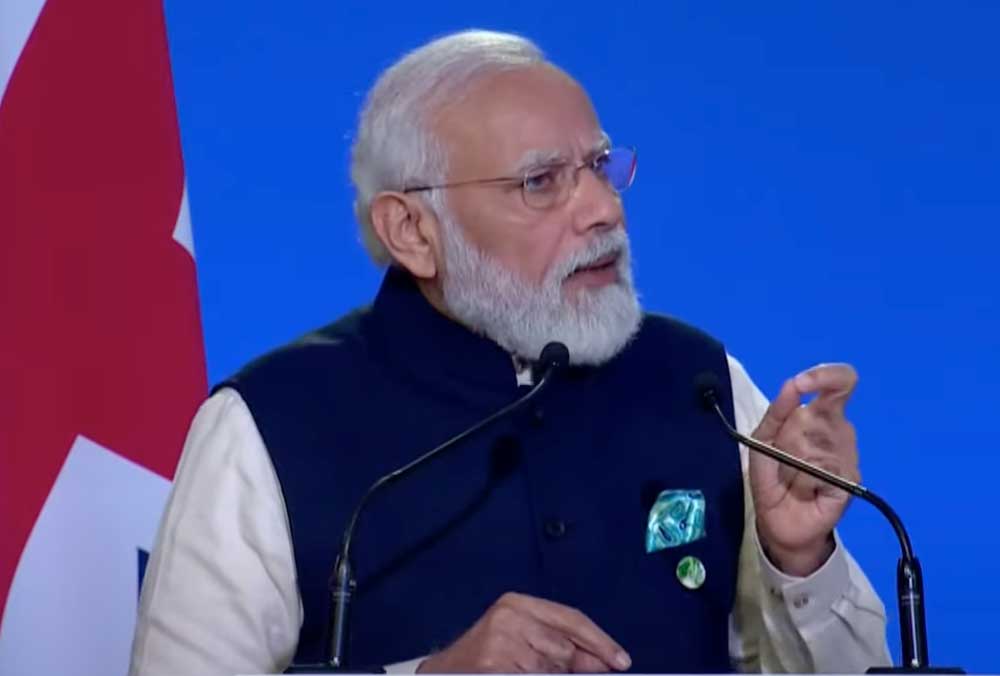Prime Minister Narendra Modi delivered India’s National Statement at the COP26 Summit in Glasgow, UK. While detailing the steps taken by India to fight climate change, he sought accountability from the developed nations in terms of their commitment to ‘Climate Finance.’

Here is a full transcript of what he said.
“Friends, I represent the country that presented this Mantra thousands of years ago.
‘Samgacchadhwam, samvadadhwam sam vo manamsi janatam’
In this 21st Century, this has become more relevant, more significant.
Samgachadhwam – let us all walk together
Samvadadhwam – let us all discuss together
Sam vo manamsi janatam – Let our hearts / minds be together
When I had first been to the Paris Climate Summit, I didn’t intend to join merely with a promise. I participated with a vision for the entire humanity.
I come from a culture that said ‘Sarve Bhavantu Sukhinah’ ( May everyone be happy )
That is why, for me, the Paris Summit isn’t just a Summit but a Sentiment, a commitment.
India was not making a promise to the world but to itself.
I am happy to say that India, a developing nation that works around the clock to alleviate poverty and provide ‘ease of living’ to crores of people, is responsible for only 5 percent of the world’s emissions, despite representing 17 percent of the world population.
We did not leave any efforts in fulfilling our obligations. In word and spirit, we, a major economy, delivered on the Paris commitment.
We are resolute, we work hard, and we bring results to the table. We can show our track record. My words aren’t just noise but a roar of victory made by the bright future of the next generation.
In terms of installed renewable energy, India ranks fourth in the world.
In the last seven years, India’s non-fossil fuel energy has seen an increase of 25 percent.
Passengers, more than the world’s population, travel in Indian trains every year. This extensive rail system has set a zero-emission goal by 2030. This step alone will reduce emissions by 60 million tonnes a year.
Similarly, our extensive LED bulb mission is reducing emissions by 40 million tonnes a year. With great determination, India is working on several such projects.
India has given institutional solutions on the world stage by initiating an International Solar Alliance.
For Climate Adaptation, we initiated the Coalition for Disaster Resilient Infrastructure. This is a critical mission aimed at saving crores of people.
(CDRI, founded in 2019, is headquartered in New Delhi).
Today, the world agrees that a lifestyle change would play a key role in climate change.
I propose a ‘One World’ movement.
It is necessary for all of us to come together and collectively practice ‘Lifestyle for the environment,’ as if it were a mission. Environmental consciousness can turn this into a mass movement.
It is time for mindful and deliberate utilization instead of mindless and destructive consumption. This can bring about a revolutionary change in diverse areas such as fishing, agriculture, wellness, dietary choices, housing, packaging, hospitality, tourism, clothing, and energy.
The crores of people in the world making conscious choices will take this a billion steps forward.
On behalf of India, I propose five ‘Amrit Tatva’ (Panchamrit)
- By 2030, India will increase its non-fossil fuel energy capacity to 500 GW.
- By 2030, India will use renewable energy for half of its entire energy requirements.
- By 2030, India will reduce its carbon emissions by a billion tonnes.
- By 2030, India will bring the carbon intensity of its economy to less than 45 percent.
- By 2070, India will bring its net emissions to zero.
This will be a great contribution to climate action.
We are all aware that all the promises made so far on ‘Climate Finance’ have proven to be empty.
When we increase our ambition for climate action, the ambition set for ‘Climate Finance’ in Paris Summit cannot remain the same.
As India commits to walk this new path, Climate Finance, and the transfer of technology behind low-cost energy become more relevant.
India expects the developed nations to make a trillion dollars available in Climate Finance.
We must track the ‘Climate Finance’ like we track ‘Climate mitigation.’
It is only fair that those who backtrack on their promises on Climate Finance must face increased pressure.
On climate, India walks the path with great courage and determination, and we also understand the challenges faced by developing nations.
The steps taken now will ensure a bright future for the generations to come.
Mr. President, I may have taken more time than what wa given, but I believe it is my responsibility to give a voice to other developing nations. Thank you.”